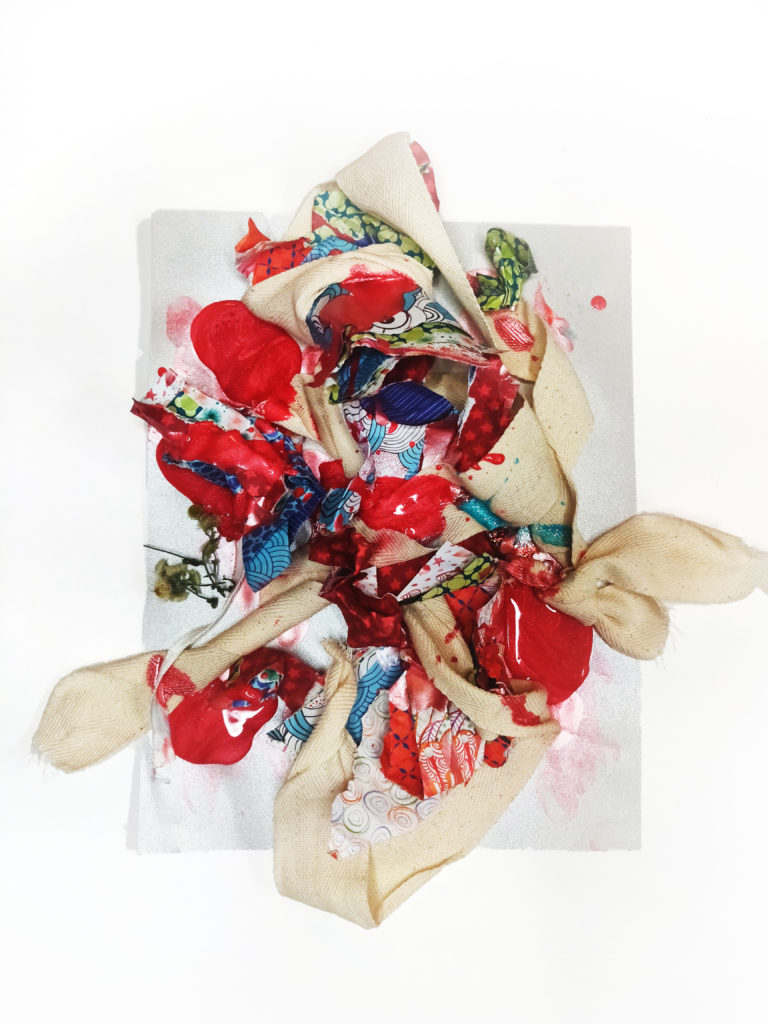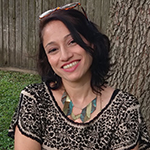Echolocation with Self and Body Parts
It’s the eyes slit into walls, half open lids
that tricks. The lips beneath the eyes blue & frost-bitten.
Corpse pose. But a crowbar jams against cut and quartered,
clicking tongues to find the jigsaw of other parts.
A foot in the door, a silent wrenching turning beneath the ground.
Nearing exhaustion, slit eyes with lids half closing. Half breathing.
Feeling for the one other body part, a hand, a rib, a foot,
a labia at a time. Where are you, the inner thigh calls to vastus lateralis.
Furrows of corpse flower, quartered and twinned yet firm against cuts & crowbar.
A jaw’s gotten free and is having dinner with the dandelions.
Behind the supper party, a knee and a femur knock on the door
with cracked walls, shutters half open. Let us back in.
Outside loose limbs make cacophony with their reaching
and clacking, hitting elbows into table corners, crowns into leg bones.
Knocked out into corpse pose. Waiting vultures in fours opening beaks like crowbars.
The unpeopled people make slits into walls, can see half
dissolving selves in parts, whole, or half-rendered.
The crowbar useless to the coffin.
But it’s corpse that feeds the fauna, forests the tree its crowns.
& only the mouth drops into the earth, only voice textured in fur,
velvet in fissure and sediment. It can never be lost without its tether.
From under the earth, waiting to hear what I’m doing
just yet and what mercy opens its eye.
Muscle Memory (2020)

Illness and Origami
Inside ourselves, we
are folded:
lines for future folds, reference
points, hidden or interior lines.
An old recipe of heart songs
and nightmares.
Folds get unfolded: the blood, the veins,
the cells, the bones.
Collapsed, secreted, warped.
A traveling purse that takes a virus whole
and lets it burrow into the spirit-matter.
This is how a year of illness
sheds leafs from a fever-tree.
The in-and-out sight of your last love, his dark lashes.
*
Bloody coughing, half-sleeping, breathing cut
and rough,
do the body and the mind exist in the mirror images,
combined with double squash, swivel fold? Everything hazes as they
exist side-by-side, in this common valley of sick.
Points are brought together at a single spot of destruction
to believe that we are so irreducibly complex—all it takes is one blow.
Folds get unfolded, in any case. The inside reverse fold, used to change
direction of a flap, and inside the body’s well sits mountain,
valley, rabbit-ear folds creased along the walls:
birthing flaps that wave like tattered flags
the white flutter of surrender
or the triumph of a woman’s skirt in spring.
I’m going to die like this.
*
Winter had ended and still I could not sit up.
Leave me here, I tell my husband.
*
The mind the body the mind the body
I am the object combined in three easy steps:
pre-crease forever, then collapse and collapse.

Leslie Contreras Schwartz is the 2019-2021 Houston Poet Laureate. Her fourth book, Black Dove / Paloma Negra (FlowerSong Press, 2020), is a finalist for the 2020 Best Book of Poetry from the Texas Institute of Letters. Her work has appeared in Missouri Review, Iowa Review, [PANK], Verse Daily, Pleiades, Zocalo Public Square, and Xicanx: 21 Mexican American Writers of the 21st Century (University of Arizona, 2022), edited by ire’ne lara silva, among other publications. She is a member of the Macondo Writers’ Collective, and is a proud disabled Mexican American poet with roots in Texas and Houston going back several generations. She teaches writing workshops in the community. She is also currently a faculty member at the new Alma College’s MFA low-residency program in creative writing.

 BACK TO ISSUE
BACK TO ISSUE